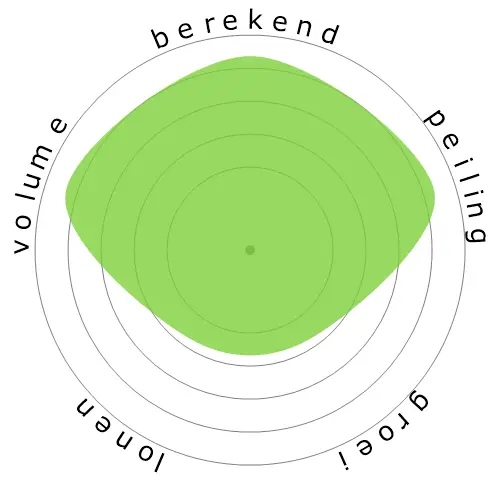Middelbare School Leraren, Behalve Speciaal en Beroeps/Technisch Onderwijs




Mensen bekeken ook
Berekend automatiseringsrisico
Minimaal Risico (0-20%): Beroepen in deze categorie hebben een lage kans op automatisering, omdat ze doorgaans complexe probleemoplossing, creativiteit, sterke interpersoonlijke vaardigheden en een hoge mate van handvaardigheid vereisen. Deze banen omvatten vaak ingewikkelde handbewegingen en precieze coördinatie, waardoor het moeilijk is voor machines om de vereiste taken te repliceren.
Meer informatie over wat deze score is en hoe deze wordt berekend, is beschikbaar hier.
Gebruikerspeiling
Onze bezoekers hebben gestemd dat er een kleine kans is dat dit beroep zal worden geautomatiseerd. Deze beoordeling wordt verder ondersteund door het berekende automatiseringsrisiconiveau, dat een schatting geeft van 16% kans op automatisering.
Wat denk je dat het risico van automatisering is?
Wat is de kans dat Middelbare School Leraren, Behalve Speciaal en Beroeps/Technisch Onderwijs binnen de komende 20 jaar vervangen zal worden door robots of kunstmatige intelligentie?
Gevoel
De volgende grafiek wordt opgenomen waar er een aanzienlijke hoeveelheid stemmen is om zinvolle gegevens weer te geven. Deze visuele weergaven tonen de resultaten van gebruikerspeilingen in de loop van de tijd en bieden een belangrijke indicatie van sentimenttrends.
Gevoel over tijd (jaarlijks)
Groei
Het aantal 'Secondary School Teachers, Except Special and Career/Technical Education' vacatures zal naar verwachting afnemen met 0,6% tegen 2033
Totale werkgelegenheid en geschatte vacatures
Bijgewerkte prognoses zijn verschuldigd 09-2025.
Lonen
In 2023 was het mediane jaarloon voor 'Secondary School Teachers, Except Special and Career/Technical Education' $ 65.220, of $ 31 per uur
'Secondary School Teachers, Except Special and Career/Technical Education' werden 35,7% hoger betaald dan het nationale mediane loon, dat op $ 48.060 stond.
Lonen in de loop van de tijd
Volume
Vanaf 2023 waren er 1.045.170 mensen in dienst als 'Secondary School Teachers, Except Special and Career/Technical Education' binnen de Verenigde Staten.
Dit vertegenwoordigt ongeveer 0,7% van de werkende bevolking in het hele land.
Anders gezegd, ongeveer 1 op de 145 mensen is werkzaam als 'Secondary School Teachers, Except Special and Career/Technical Education'.
Functieomschrijving
Onderwijs één of meer vakken aan studenten op het niveau van de middelbare school.
SOC Code: 25-2031.00


Opmerkingen
Leave a comment
Due to remote learning and using similar designs that you mentioned, we have seen a 210% spike in high school drop outs, a 600% up shot of kids having at least 2-3 failing grades, and a gap between students who do not have access to tutors, internet or computers (or all three). A robot cannot tell an elementary student to reengage their students, let alone the sheer horror of classroom discipline being thrown out. Also, lets be real honest with secondary students, if they are given a generic problem trust me they will plagiarize and copy that down (just look at quizlet, or "write my paper" for proof). A human being needs to see if a student "gets" what is going on. A Teacher needs to have group interactions (and trust me you cannot do any sort of interactions with remote even with current programs- students just shut their cameras and mute themselves). Unless you are suggesting that a "few" will benefit from this dystopia, if so thank you Nancy Devos for your insight, but we educate everyone, and not the 1%.
Do you think the software being used led to those changes or the pandemic and economic downturn itself?
Easy to pass judgment when you have already drawn your conclusions. I've taught off and on since 2008 (mostly on, mostly secondary). Quizlet is the worst example you could provide of instructional technology we could employ to help all students.
When you discuss the one percent, you highlight a certain security the wealthy have that leads to less interruptions of education and that's a fair point. But I am not trying to describe a dystopia, but rather a better way to differentiate and tailor student learning to their particular needs, desires, strengths, and weaknesses.
Much of what effective teachers do is driven by inputs, points of data, about their students and their teaching. A properly designed system could analyze those inputs and apply strategies to intervene. It doesn't really matter the input, either.
Now that we are rolling out SEL technologies to help our kids, language translation applications that can help English learners, standards-based, interactively branching assessments and activities, the amount of information received is nothing trivial. The digital divide does truly make this a difficult prospect for some students, but that's not the question we are discussing here. Can teachers be replaced by "robots" in the future? Yes. Nothing would be more student-centred.
If the argument is about the socialization of students, that's not facilitated by teachers. It's actually stunted. Imagine learning plans that don't waste time with sages on stages. Imagine a truly adaptive system to check for understanding and intervene. Imagine that happening simultaneously for all students without the interruptions all teachers face daily just trying to teach. I realize virtual, and hybrid, learning did not go well for all students, but it was year one...something never attempted, and there was a society gone wild coupled with the inexperience of systems, personnel, and students.
I love teaching. I take it personally. But, if students were able to learn better from a robot than from me, I wouldn't take it personally. I'd celebrate it.
Learning with a teacher can mean a number of scenarios, including utilizing the learning software you mentioned.
The assurance of having someone who knows more than you, or at least knows where to find answers and explain them, will result in teachers have a very secure job.
I haven't even mentioned the emotional support and connection that makes a learning environment better, something I don't foresee AI replacing because seeing assuring words pop up on my screen is not the same as hearing it from a teacher, who is making eye contact with me and using body language.
Laat een reactie achter over dit beroep